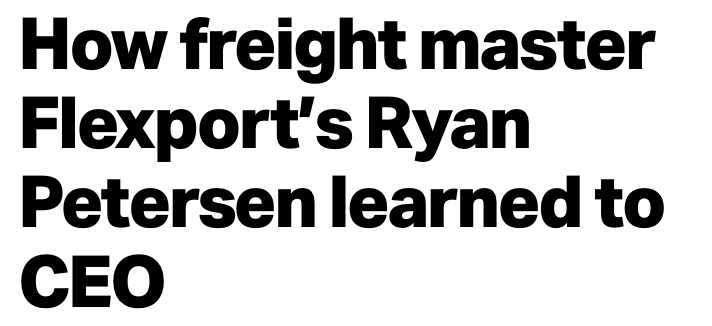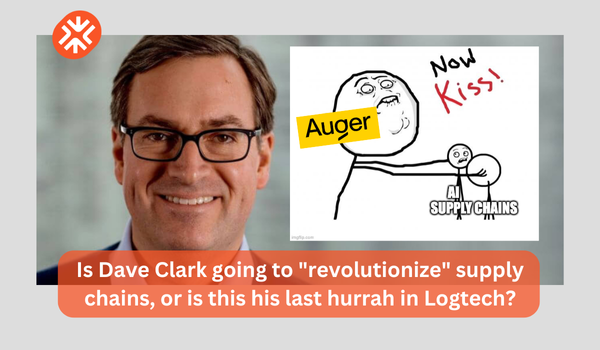Flexport Does Everything Big, Including Layoffs.

Is Flexport testing the water to see just how big of a layoff round they can get away with? Are things really made worse by Dave Clark's short time as CEO? Will he be used as an excuse to hide the sad reality that Flexport can only handle a reduced geographical footprint which has been heavily impacted by the drop in trade volumes?
The whole situation is an absolute textbook mess that you could not believe without seeing it unfold in front of your eyes. So what's next?
Flexport is Going to Sacrifice its People First.
We've got intrigue, two sides fighting each other, each with their own supporters and haters. In the middle? Over 3,500 employees (according to LinkedIn), and $2.4bn raised. Employees that are behind Ryan are hoping that he will steer the ship back towards profitability and with it take their stock options to new heights. The investors seem to be hanging on by the skin of their teeth, hoping that the return of the chosen one, Ryan Petersen, will make it all better, like a soft lullaby from a caring mother to a sick child.
But here is the thing: Ryan isn't playing the role of the doting mother here. He will have to be harsh, make bold decisions, and potentially cause a lot of pain, before things could even slightly improve. And that ,unfortunately, will start with layoffs.
The question is how deep will those layoffs go, and which teams will be impacted?

Flexport's Customer Service is Safe, but Why?
If the hypothesis is that Flexport is a freight forwarder first, and they need to cut costs, then you would imagine that customer service would be impacted due to the drop in volumes and the lack of any positive indicators leading into Q1 2024 and beyond.
Unless their customer service teams were already understaffed, which would explain how they can have a round of layoffs without touching customer service. Another interesting quote is that of "our ability to help grow our customers' businesses." How do you even begin to break this down? You would first need to understand how Flexport contributes to customer growth.
Can't figure that out? Neither can they it seems, as their valuation has allegedly dropped 80% to less than $1.5bn and as said by now CEO Ryan Petersen "we're far from profitability".
Can Flexport Afford To Fire Sales, Marketing, and Devs?
Yes.
Here's the situation at Flexport right now: they spent 9 years building a core product, changed CEO, forgot everything they'd been working on, got distracted by ecommerce and delivering to the door, bought an expensive product to fast track that strategy, and now are going "back to basics" after realizing that Amazon and Shopify have more or less done them dirty.
This leaves the company in a desperate position as they still employ a number of people that are deemed surplus to requirements, leftovers from the anomaly that was caused by exceptional macro factors.
This trimming already started in January this year, when they joined the likes of Amazon, Salesforce, Coinbase, and Meta, by cutting 20% of the workforce, around 640 people. They plan to add 1,000 more, or 30%. Will they benefit from the same layoff packages? The U.S. employees got:
- 12 weeks severance
- 6 months healthcare
- 2022 bonus payment
- equity vesting acceleration
- immigration support
With $1bn in the bank, Flexport can easily afford to do this, and more, for its soon to be ex-employees. But will they?

And who will these employees be? I can see sales and marketing being impacted as Flexport needs to now spend time growing its geographical reach, enhancing its product connectivity, and actually building a product. With a limited scope to sell, and their key NA to China lanes in disarray right now, sales and marketing spend makes little sense. You can also imagine people on the "ecommerce" product side will be heavily impacted, with the product being DoA as far as growth and ROI potential. Write it off, back to basics, go again.
Where Are Flexport Heading Next?
Flexport is changing strategy once again.
They were a forwarder, then they moved into ecommerce for whatever stupid reason that had them up against the likes of Amazon, a battle they could never win. Shopify now own a considerable portion of Flexport, but are they at all interested in the outcomes now that they have gotten rid of Deliverr Inc. in a move that suited them greatly and paved the way for "Buy with Prime"? Not forgetting this move potentially suited Ryan greatly from a personal financial gain perspective.
But now that someone else has taken the heat for these questionable moves, and Ryan has cashed-in, he is back to save the day at Flexport. Or at least that it what it will say on his LinkedIn page and Twitter account. The question is, how does he plan to do that?
"A Flatter Organization"
It looks like Ryan is going to use layoffs as a way to return quickly to profitability. Interesting strategy, or the sign of a failed approach with too many chefs in the kitchen?
This makes sense when thinking back to previous comments about customer service being safe. The layoffs we are likely to see today are potentially going to be management focused, alongside sales and marketing, but what does this really lead to?
The question is intent.

Is the freight master looking to create a flatter hierarchy to essentially assume full control of all teams, and have a greater influence to build his vision? Or is this just an attempt to cut the more expensive payslips and a way to use people, their lives, and their careers, as a "quick way" to get closer to profitability and please investors?
We've seen a similar behavior coming from the likes of project44, who seem to ignore the true cost of hiring and firing vs retaining good people. Let's just hope Flexport doesn't start acting the same way, and has a solid strategy in place to build with the teams and people they have.
Money, money, money.
Flexport's valuation is said to have tumbled 80% from $8bn down to $1.4-$1.6bn. A valuation that will likely be confirmed when they attempt to raise more funding to build their next iteration of disruptive technology that an archaic industry in desperate need for digitalization is crying out for.
As things stand, they have money in the bank, but we have no idea how bad their situation really is. During Covid, they were one of the big winners and happily flaunted their financial gains for all to see, as a means of attracting more investment. With the dust settling, they've gone awfully quiet, and we have no insights into their sales figures at all. When looking at the likes of Expeditors and Kuehne+Nagel, to name but two of the world's most well known brands, Flexport's figures should at least be half that of during the pandemic.
If sources such as The Information are to be believed, Flexport's H1 revenue for 2023 has fallen off a cliff, sitting at 70% of what it was last year at $700mn. What would this mean? Without a peak season this year, which is a highly likely outcome, Flexport would be lucky to make anywhere close to half their last reported $3.3bn revenue figure. Some cliff they've fallen off.
The picture gets worse when you factor in the reported $300mn burn in H1 this year, again reported by the team at The Information. With Dave Clark's senior management team gone, and the incoming 1,000 strong layoff wave, that'll definitely shrink the burn rate, but will it change anything?
Has Flexport Damaged Itself Beyond Repair?
We've seen it all as far as Flexport related content is concerned. The haters have been screaming "I told you so" every day on social media. Those who actually enjoy logistics technology and believe that our industry is overdue some innovation, take a slightly more nuanced view.
I like to think myself in that second category, but that doesn't stop me from doubling down on what I initially said when Dave Clark was hired: he is not the man for the job. Flexport wants to be a tech company. They don't care about the forwarding part, that is a means to an end, a cash cow to build the tech. Their goal is become some kind of overarching net for global freight forwarding, allowing BCOs more freedom of choice and circumventing the integrators and well-established top 25 3PLs/forwarders.
When the ex-CTO James Chen left the company, I raised my concerns about the lack of a replacement in this role. Strange for a tech company. That for me was the moment the irreparable damage started to occur, and where the company started going down the path of failure.
No matter what Dave and Ryan's feud reveals, or the tit for tat on twitter/x that belongs in an elementary school playground rather than in big business, they should have led with tech, rather than whatever it is they tried to do. Especially with the writing on the wall regarding volumes and the overall carnage in the logistics space right now.

The big question is: between the ecommerce distraction, Dave Clark's rough year at the company, the public meltdown... does Ryan still have the investor's backing, and will they be patient enough to wait for whatever this "back to basics" rebuild will become?
Or are they already begging for cents on the dollar in a bid to salvage whatever they can from this train wreck.
We May Owe Dave Clark a Thank You.
To conclude, and I preface this by saying I'm not taking sides, but we may owe Dave Clark a thank you.
Not for what he achieved at Flexport. Not even for his contributions at Amazon (from what I've heard, he was a bit of a dick towards employees and didn't leave on the best of terms). But for what he has exposed to the world.
Before his time at Flexport, we had big announcements, $5bn targets, medals from Barack Obama, and a whole lot of founder led overly-charismatic smoke and mirrors. We never really knew what Flexport was trying to be, nor how they were going to get there, yet investors poured money into the concept like it was the next big thing in logistics technology and/or freight forwarding.
Today, we see Flexport for what it may really be: a pile of burning cash with no core product to show. Remind you of anyone else that has been in the headlines lately?
I do not believe that this is the end for Flexport. They can make something of their technology, but I doubt the financial situation will allow them to truly focus there. They need to rebuild a senior leadership team, starting with a new CEO who is not as emotionally involved, followed by a strong CTO, COO, and CRO combination. From that core, focus on the tech, build something that the industry wants to use, and success will follow.
Back to basics means profitability, ROI, and realistic objectives. Not easy to achieve after raising $2.4bn on empty promises and being worth half that today.
Good luck to everyone who has Flexport stock, it is going to be a very bumpy ride.
Hi, I'm Anthony, and I'm a bit of a Logistics and Logistics Tech Nerd. My opinions are my own, and I encourage you to share yours. Let's attempt to make Supply Chains and Logistics a more transparent and high-value place.
Catch me on LinkedIn for more regular updates between newsletters.





